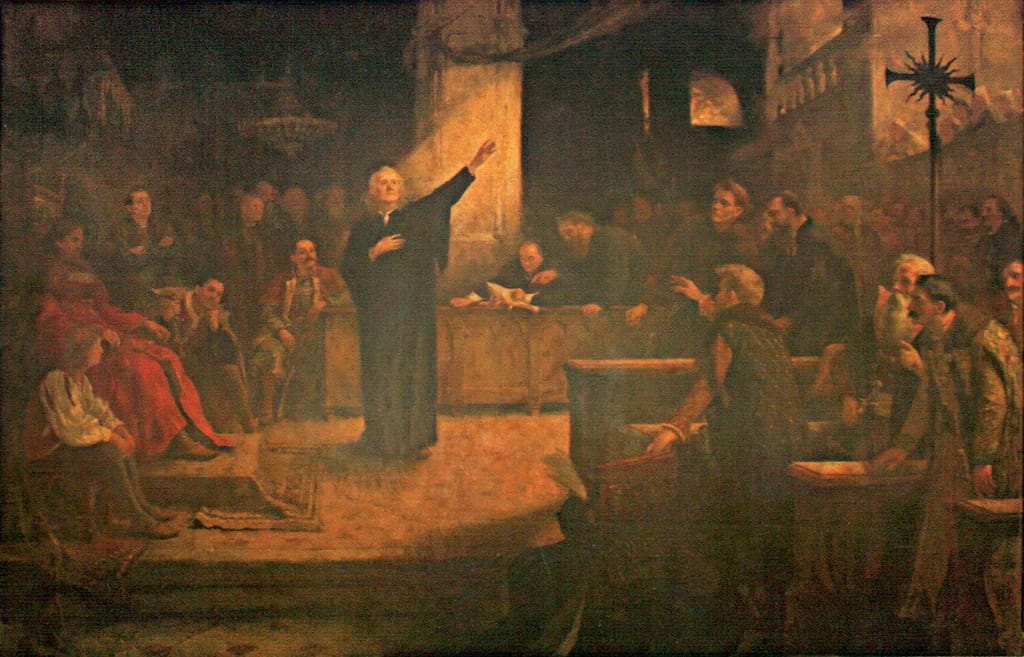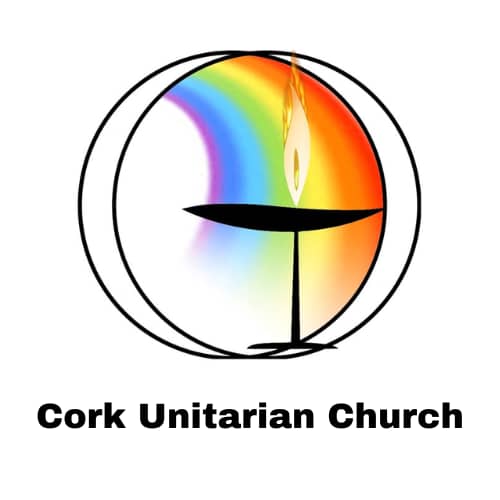
Ferenc Dávid Seeking Unitarian recognition in 1568 at the Diet of Torda (Kingdom of Hungary – now modern Romania). The resulting Edict of Torda stated that “faith is the gift of God” and prohibited the persecution of individuals on religious grounds.
Early Origins
Some of the principles associated with Unitarian thinking can be traced back to the earliest struggles of the Christian churches to articulate a coherent theology. However, the origins of the Unitarianism as an organised movement began in 16th-century Europe. New patterns of thinking had emerged in the Renaissance, beginning in Italy, while further north the Protestant Reformation had affirmed the right of private judgement in matters of religion. But the established authorities of the established churches, set boundaries beyond which thinking was not to venture. There were some few independent thinkers, however, who were not prepared to accept such limitations, and felt morally obliged to follow wherever their unfettered reasoning would lead them.
Persons of this kind eventually became the founders of the Unitarian movement. Mostly Italians in the first instance, they had to leave their homeland if they valued their lives, because persecution was rife not only there, but wherever the power of state and church could be invoked against them. They took refuge in what were then the two most tolerant countries in Europe, Poland and Transylvania. There they joined with indigenous fellow-thinkers to establish congregations. In Poland, the forces of reaction were able to kill the movement after a century of existence, but in Transylvania (now part of Romania) it has maintained its existence, usually under very adverse conditions, right down to the present day.
While it is common to associate Unitarianism as a Reformation church, it is more historically accurate to think of Unitarianism as a dissenting church. The three largest Reformation church movements (i.e. Lutheran, Calvinist, and Anglican) each developed their own alternate theologies and ecclesiastical governance, and then quickly developed as national churches to the extent that they became new established state religion. At time time many nation-states were looking for an alternative to the foreign influence of the Roman Catholic church, but were still looking for a single point of social control providing uniform and controlled religious expression. Dissenting churches did not fit this model as they rejected uniform religious expression. As a result they were subject to persecution from all sides during the Reformation. An example of this is Michael Servetus (1509-1533), a distinguish Spanish scientist and theologian. In his writings, Servetus rejected the contemporary Christian doctrines of the Trinity as being non-biblical. Ironically, Servetus proved himself to be one point on which the Roman Catholic Inquisition, John Calvin, and Martin Luther could all agree on – they all condemned Servetus. For having dissenting views, Servetus was burnt alive atop a pyre of his own books in the city of Geneva in 1533.
Later British Origins
In England, Unitarian ideas were being discussed by the mid 1600s in the writings of John Biddle (1615-62), and the first Unitarian congregation came into being in 1774 at Essex Chapel in London, founded by a former Church of England minister, Theophilus Lindsey. Other influential thinkers included: John Locke, Sir Isaac Newton and John Milton, and Joseph Priestley.
Irish Origins
Unitarianism in Ireland dates back to the 1600s with early recorded communities in Dublin and Bandon, Co. Cork, it has its roots in the Puritan Non-Conformist / Dissenters who did not subscribe to established church doctrines, like Westminster Confession. Unitarianism was illegal up until 1813. In 1809 the Synod of Munster was founded when the non-subscribing presbyteries Dublin and others in the South of Ireland came together. In 1830 the Irish Unitarian Society (for the Diffusion of Christian Knowledge) now the Irish Unitarian Christian Society was formed. Among its founders was Rev. Dr. James Armstrong, who promoted Unitarianism particularly in the South of Ireland by publishing books and other works. In 1835 the Association of Non-Subscribing Presbyteries was formed. In 1910 the Non-subscribing Presbyterian Church of Ireland was formally established with the merger of the Antrim Presbytery and Remonstrant Synod of Ulster. In 1935 the Unitarian Synod of Munster joined the Non-subscribing Presbyterian Church of Ireland.
Unitarianism Today
Unitarianism today is an open-minded and individualistic approach to religion that gives scope for a very wide range of beliefs and doubts. There are about 7,000 Unitarians in Great Britain and Ireland, and about 150 Unitarian ministers. There are about 800,000 Unitarians worldwide.
